#sustainable economy
Text
Fair Trade
By going beyond accreditation practices, consumers and companies can reach those at the bottom of the global social production ladder. Nonetheless, these efforts require purchasers to take personal responsibility for their impact, rather than relying solely on certifications. Simply by being more thoughtful and ethical in our sourcing practices, we have a huge opportunity to create brighter futures for all people and their families throughout the supply chain.
https://borgenproject.org/fair-trade-product-markets/
Despite many well-intentioned consumer attitudes, fair trade product markets frequently feature marketing strategies that conjure up imperialistic images [...]
[...] In products marked as fair trade, the certification might only apply to the product’s raw materials, rather than the full process of production. [...] A 2014 study theorizes that these practices are somewhat effective, “although on a comparatively modest scale relative to the size of national economies"
Social Media conversations about Fair Trade Practices:
[From user seriousxdelirium] - Like almost all other labels for coffee, it's absolutely useless. It only applies to growers large enough to afford the fees, and is not regulated well enough to make meaningful impact on the industry. If you really care about this sort of thing, do some research and develop an understanding of what you think a fair price is for farmers, and ask roasters what they paid for that coffee. Most good roasters are willing to be transparent about that sort of thing, and even publish transparency reports where you get a breakdown of the entire transaction.
From user Ramakrishna Surathu:
[...] Here are some reasons why fair trade may not always be as fair as it seems [...]
1. Market Access and Power Imbalances: Fair trade initiatives often focus on small-scale producers in developing countries, who may face challenges in accessing global markets and negotiating fair prices. Power imbalances within supply chains, influenced by factors such as geography, politics, and market dynamics, can limit the ability of producers to fully benefit from fair trade practices.
2. Certification Costs and Barriers: Obtaining fair trade certification can be costly and time-consuming for producers, particularly small-scale farmers and artisans with limited resources. Certification fees, auditing expenses, and compliance with standards may pose financial barriers and administrative burdens, leading some producers to forego certification altogether.
3. Limited Impact on Poverty Alleviation: While fair trade aims to reduce poverty and improve livelihoods, its impact may be limited by systemic barriers and structural inequalities. Addressing poverty requires broader social, economic, and political interventions beyond the scope of fair trade alone, such as access to education, healthcare, land rights, and infrastructure.
4. Market Volatility and Price Instability: Fair trade prices are often based on predetermined minimums, which may not fully reflect fluctuations in global market prices. Producers may be exposed to market volatility and fluctuations in demand, which can impact their income and livelihoods, particularly in commodity markets subject to price instability.
5. Complexity of Supply Chains: Fair trade supply chains can be complex and challenging to navigate, especially in regions with limited infrastructure and logistical challenges. Ensuring compliance with fair trade standards, maintaining transparency, and traceability throughout the supply chain can require significant investment in monitoring and management systems.
[...] Some manufacturers also use tricks. For example, some products do not explain exactly which part of a product was produced fairly. Another trick is to increase the percentage of "fair" ingredients by subtracting out the water content. The credibility is of course "fair watered".
[...] The statement here should not be that fair trade is useless, but one should always question things or understand them better and not just be blindly guided by seals in the purchase decision. Since this works so well, manufacturers like to use such seals or make one up themselves.
[...] rather than cutting out the middle man, and offering farmers a more direct compensation for their work, Fair Trade still facilitates a level of bureaucracy that supports an uneven distribution of revenue.
[...] The price point that separates Fair Trade produce from the rest of the market is often significant enough that lower-income households cannot afford to budget for it. This means that Fair Trade cannot reach mass markets in a way that would really effect wide-scale change, and instead serves as a token gesture to alleviate the guilt of middle-class consumers.
[...] [premium pricing coffee] is a worthy move if the coffee is of a high quality, but if it is not of sufficient quality to merit this price tag, then it risks turning consumers away from Fair Trade produce, and further impeding its reach to mass markets [...]
Fair Trade is a concept worth embracing, but first it must prioritize effective and transparent processes of production and distribution. What Fair Trade aims to achieve is admirable, but what it could potentially achieve is far greater [...]
#having another crisis last night while researching organic mattresses and#considering which companies to buy from that are organic certified AND run with ethical business practices#damn near impossible to purchase anything sans explaintation#my greens#fair trade#sustainability#sustainable economy#economy#green link#direct trade#farming#agriculture#luxury items#premium prices
8 notes
·
View notes
Text
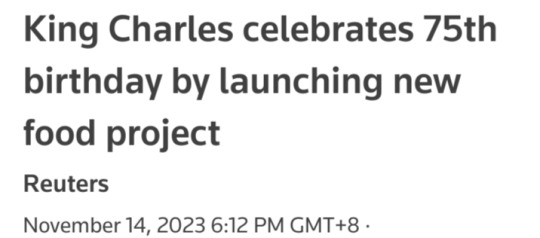



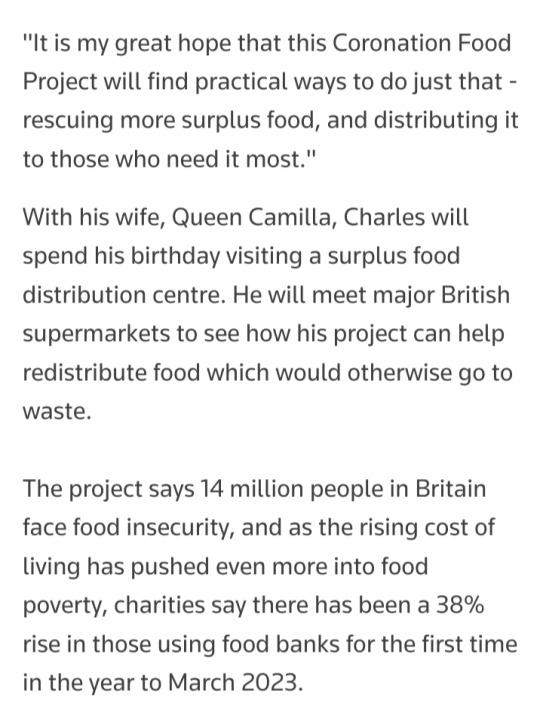



#King Charles III#Charles III#His Majesty The King#HMTK#British Royal Family#Coronation Food Project#surplus food distribution centre#food insecurity#food waste#food poverty#food banks#sustainable economy#Big Issue#surplus food#Prince's Foundation#Highgrove House
10 notes
·
View notes
Text
Uninventing Market, Profit, and Capitalism: A Moral Imperative for a Sustainable Future
Bloganuary writing promptIf you could un-invent something, what would it be? View all responses
Today’s prompt is in the realm of hypotheses, so I would answer appropriately.
A world without markets, profit, and capitalism might seem like a distant utopian dream, but to me, it is one worth striving towards.
Markets, profit, and capitalism are the driving forces behind our current economic…

View On WordPress
#bloganuary#bloganuary-2024-18#capitalism#cooperation#dailyprompt#dailyprompt-1821#Economy#environment#equality#ethci#fight capitalism#fight market#fight profit#market#Profit#Raffaello Palandri#sharing#sustainable economy#uninvent#Well-Being
3 notes
·
View notes
Text
What will our future entrepreneurs learn about climate? "You don't make any money with that, do you?"
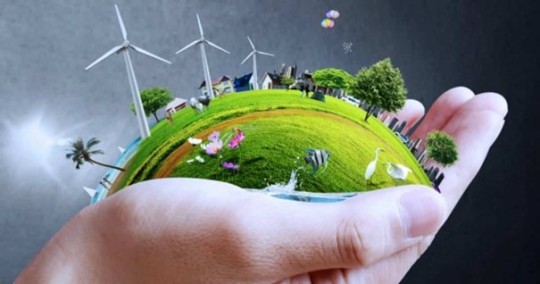
Sustainability and entrepreneurship should go hand in hand. But in many Economics courses, sustainability is at most a compulsory side subject. “It's all about the money, when you hear our professors.”
If Europe wants to achieve its climate goals, it must put the entire economy on a different footing. If that doesn't work, our companies will be crushed by competition from the US and the East. It is therefore no small challenge that the future generation of entrepreneurs, managers and economists face. And yet sustainability and climate only constitute a marginal part of their education, students say at a conference of the organization Ondernemers Voor Ondernemers (Ovo)[1]. “The climate should really be more important in our education,” says Arthur Schauwvlieghe, who is doing his master's degree in commercial engineering. 'But hey, you don't make any money with that, do you? It's all about the money when you hear our professors.”
Some fellow students at the conference laugh awkwardly, but they do not contradict him. 'Why is climate not integrated throughout our training? Now it is a specific master's or a small elective. If you silently push it into the entire economics education, more thought will be given to it subconsciously,' he believes.
Karlijn Achten (21) and Elle Cochet (21), who are following the master's degree in commercial engineering at the University of Hasselt[2], see it a little differently. 'When we talk about innovation, we often look at sustainability. You don't have those subjects if you study pure finance or economics. But shouldn't everyone be doing that?'
Proactively
However, the figures at the conference speak for themselves. If we want to limit global warming to 1.5 degrees, countries and companies will have to invest an additional nine trillion dollars in the climate.[3] Climate will be the largest investment item for these future entrepreneurs. It is therefore strange that more attention is not paid to this in training, according to Luc Bonte, chairman of Ovo and former manager of ArcelorMittal[4]. “In economics, entrepreneurship is still often seen as profit generation,” he says. “Profit is certainly not a dirty word, but it must be sustainable. Universities should take sustainability more into account. Although you notice that some universities are more proactive than others.”
Dauwe Nijs (21), who studies business management at Thomas More University of Applied Sciences[5], believes that the subject is sufficiently covered in his study curriculum. 'Sustainability is an indispensable part of learning about the economy of tomorrow, isn't it?' he says. “The subject is often discussed with us.”
However, this evolution did not happen by itself, says Lucie Somers, who teaches at Thomas More. “I also notice that teachers of subjects in Economics are often more reserved about climate as a subject, because it costs money,” says Somers. 'But for me it is essential that we try to incorporate climate into the subjects we offer.'
Norway
Somers is one of the founders of the Ice Cube[6], an entrepreneurial hub that organises courses with a focus on social entrepreneurship. “It is also important for companies to keep young people on board who can act in a climate-conscious manner. Their job may be profit-minded, but if companies are working on themes that concern young people today, that is often a reason for them to stay. It is up to us as a training program to provide with an impetus for this. That's a no-brainer.”
No matter how necessary it is, sometimes opportunities are still missed. “Our master's has just been completely adjusted and I really think it's a shame that they haven't thought about putting sustainability more at the forefront,” says Yara Luytens, who is studying the master's in finance. “I studied in Norway for a semester last year and sustainability was integrated into every subject. Whether that was financial investments or insurance, sustainability was part of it and everyone shared that responsibility. Here it is seen as something separate. But how should we learn to integrate that into a company later?”
Source
Doreen Hendrikx, Wat leren onze toekomstige ondernemers over klimaat? ‘Daar verdien je geen geld mee, hé’, in: De Standaard, 7-12-2023; https://www.standaard.be/cnt/dmf20231205_96177297
[1] Ondernemers Voor Ondernemers – OVO in short – (Entrepreneurs for Entrepreneurs) strengthens sustainable entrepreneurship in Africa. And is looking for Belgian entrepreneurs, companies and investors who support these projects with expertise and resources. https://ondernemersvoorondernemers.be/nl/over-ovo
[2] Hasselt is a Belgian city and municipality, and capital and largest city of the province of Limburg in the Flemish Region of Belgium. It is known for its former branding as "the city of taste", as well as its local distilleries of Hasselt jenever (gin), the Hasselt Jenever Festivities, Limburgish pie and the Hasselt speculaas.
[3] https://www.spglobal.com/esg/insights/on-one-end-trillions-of-dollars-to-invest-in-climate-on-the-other-huge-and-urgent-need-how-do-we-connect-the-dots
[4] ArcelorMittal S.A. is a Luxembourg-based multinational steel manufacturing corporation headquartered in Luxembourg City. It was formed in 2006 from the takeover and merger of Arcelor by Indian-owned Mittal Steel.[3] ArcelorMittal is the second largest steel producer in the world, with an annual crude steel production of 88 million metric tonnes as of 2022.[5] It is ranked 197th in the 2022 Fortune Global 500 ranking of the world's largest corporations. It directly and indirectly employs around 200,000 people and its market capital is $25 billion.[6] The total value of company assets is estimated to be around $100 billion.
[5] The largest university of applied sciences in Flanders. A community of almost 22,000 students, staff members and researchers. As a pioneer in the ‘learning by doing’ method, we offer students tailored learning through our innovative labs, hands-on course methodology and real-world project opportunities. https://thomasmore.be/en
[6] “If we teach today’s students as we taught yesterday’s, we rob them of tomorrow.” John Dewey’s famous advice for educators, although over a hundred years old, seems more relevant than ever, as we find ourselves faced with a wide range of extremely difficult – even wicked – challenges like climate change, overpopulation, a pandemic, … to name but a few. At Thomas More, we take Dewey’s advice to heart and search for new ways to train our students for jobs that do not yet exist. ICE Cube, our entrepreneurial hub, is a good example of how we bring together future professionals of all backgrounds to work in multidisciplinary teams with a focus on creativity, backed by a strong business model and a result-driven attitude. Inspire and be inspired. Get (sh)it done and create impact. That’s ICE, that’s what we stand for. https://innovationsoftheworld.com/thomas-more-ice-cube-innovation-creativity-and-entrepreneurship-must-haves-for-tomorrow/
1 note
·
View note
Text
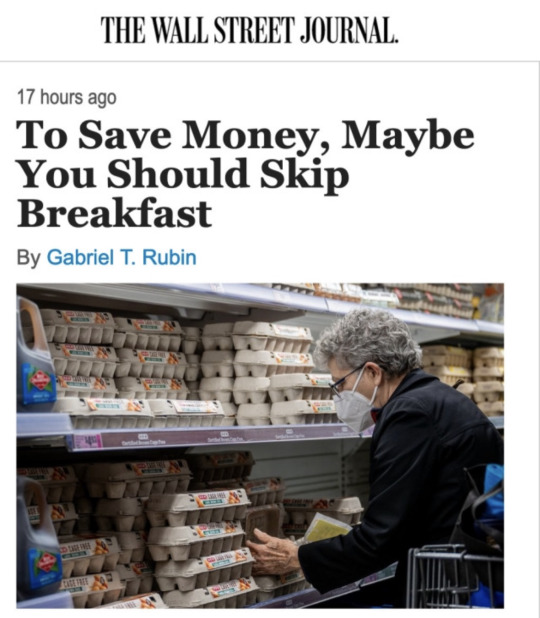
You know, this reminds me of something

Ah, yes.
#troglodyte thoughts#free range sustainable shitpost#eat the rich#poverty#economy#wages#politics#wall street journal#marie antoinette#wage disparity#class warfare
1K notes
·
View notes
Text
Cooperation and reciprocity are the new economics. Let's choose to build better, more inclusive narratives and enaction of economic regulation policies.
#new economics#market capitalism#cooperation#virtue#reciprocity#economics#modern economy#capitalism#labour#neoliberalism#equitable society#tending markets#inclusion#economic growth#economy is people#stakeholders welfare#choice#constructed narratives#sustainable economy#high functioning democracy#civil society#plutocrats
1 note
·
View note
Text
"India’s announcement that it aims to reach net zero emissions by 2070 and to meet fifty percent of its electricity requirements from renewable energy sources by 2030 is a hugely significant moment for the global fight against climate change. India is pioneering a new model of economic development that could avoid the carbon-intensive approaches that many countries have pursued in the past – and provide a blueprint for other developing economies.
The scale of transformation in India is stunning. Its economic growth has been among the highest in the world over the past two decades, lifting of millions of people out of poverty. Every year, India adds a city the size of London to its urban population, involving vast construction of new buildings, factories and transportation networks. Coal and oil have so far served as bedrocks of India’s industrial growth and modernisation, giving a rising number of Indian people access to modern energy services. This includes adding new electricity connections for 50 million citizens each year over the past decade.
The rapid growth in fossil energy consumption has also meant India’s annual CO2 emissions have risen to become the third highest in the world. However, India’s CO2 emissions per person put it near the bottom of the world’s emitters, and they are lower still if you consider historical emissions per person. The same is true of energy consumption: the average household in India consumes a tenth as much electricity as the average household in the United States.
India’s sheer size and its huge scope for growth means that its energy demand is set to grow by more than that of any other country in the coming decades. In a pathway to net zero emissions by 2070, we estimate that most of the growth in energy demand this decade would already have to be met with low-carbon energy sources. It therefore makes sense that Prime Minister Narendra Modi has announced more ambitious targets for 2030, including installing 500 gigawatts of renewable energy capacity, reducing the emissions intensity of its economy by 45%, and reducing a billion tonnes of CO2.
These targets are formidable, but the good news is that the clean energy transition in India is already well underway. It has overachieved its commitment made at COP 21- Paris Summit [a.k.a. 2015, at the same conference that produced the Paris Agreement] by already meeting 40% of its power capacity from non-fossil fuels- almost nine years ahead of its commitment, and the share of solar and wind in India’s energy mix have grown phenomenally. Owing to technological developments, steady policy support, and a vibrant private sector, solar power plants are cheaper to build than coal ones. Renewable electricity is growing at a faster rate in India than any other major economy, with new capacity additions on track to double by 2026...
Subsidies for petrol and diesel were removed in the early 2010s, and subsidies for electric vehicles were introduced in 2019. India’s robust energy efficiency programme has been successful in reducing energy use and emissions from buildings, transport and major industries. Government efforts to provide millions of households with fuel gas for cooking and heating are enabling a steady transition away from the use of traditional biomass such as burning wood. India is also laying the groundwork to scale up important emerging technologies such as hydrogen, battery storage, and low-carbon steel, cement and fertilisers..."
-via IEA (International Energy Agency), January 10, 2022
Note: And since that's a little old, here's an update to show that progress is still going strong:
-via Economic Times: EnergyWorld, March 10, 2023
#india#solar power#renewable energy#green energy#sustainability#wind power#population grown#economic growth#developing economies#renewable electricity#carbon emissions#good news#hope#hope posting
855 notes
·
View notes
Text
Sign the petition to demand the creation of a new international law requiring fast-fashion garments to come with a statement of the human cost and environmental harm caused by their creation.
We all know fast fashion is bad for the planet - slave labor, environmental waste, air and water pollution, and unsustainable practices are just a few of the ways they impact our planet, our health and our lives. To date, the fast fashion industry is the 2nd largest consumer of water and is single-handedly responsible for 10% of global carbon emissions (that's more than all international flights and maritime shipping across a year combined). Even the simple act of washing these clothes releases 500,000 tons of microfibers into the ocean each year - that's equal to 50,000 plastic bottles. Fast-fashion is the 3rd leading cause of the climate crises we face, yet is rarely addressed.
Knowing these stats is one thing, and understanding them is important. Being aware of them is somewhat informative. But as long as we keep turning a blind eye to the issue, the stats are only going to get worse, and nothing will change for the better. Ignoring the issue or brushing it under the rug won't help anything. So what if we could see the real-world damage done by each of the garments we buy?
In the same way that cigarette packets have shown the harm their products do to our bodies ("SMOKING KILLS", lung cancer visualizations, etc.), what if fast fashion manufacturers & retailers had to show the harm their products do to our planet?
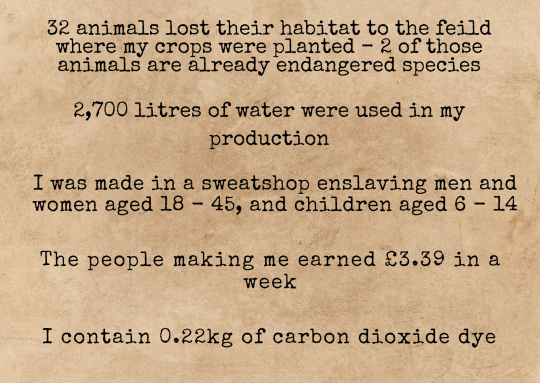
[Image ID: A type-writer font has been used on a brown craft paper background. The text reads: "32 animals lost their habitat to the field where my crops were planted - 2 of those animals are already endangered species. 2,700 litres of water were used in my production. I was made in a sweatshop enslaving men and women aged 16 - 45, and children aged 6 - 14. I contain 0.22kg of carbon dioxide dye." End ID.]
This is a mock-up of a label / statement for a single T-shirt, with researched statistics and educated estimates for the information I couldn't find a calculated answer for.
Now imagine labels / statements like this for every single piece of clothing: how many toxic chemicals are in those new jeans? How many litres of water did that shirt take to make? How many animals were skinned to make those cute fur-trimmed boots? How many children made that jumper? How many people were forcibly removed from their homes, so production companies could plant crops to grow the materials used in clothes manufacturing? How many families were evicted for no reason other than corporate greed? How many trees were cut down? How many animals were displaced or killed?
Would you really want to buy those items of clothing if the answers to those questions were staring you in the face?
If this information was stated in clear, accessible ways on both the website and the ticket on the actual garment, this would dramatically reduce the number of people buying fast fashion items. It would also reduce the profits being made by fast fashion companies, and could lead to many of them being forced to choose between changing and becoming sustainable, eco-froendly and ethical brands, or shutting down due to being boycotted.
Who would really want to knowingly buy things that are made by slaves, or which cost a family their home, or which contributed to deforestation? Who would continue to buy fast fashion items knowing this is the damage caused by them, when sustainable alternatives are an option?
Whether it's second-hand fashion at affordable prices, or investing more money in sustainable products which were made with high ethical standards and which cost more money due to the fact their price accounts for the time it took a person to make that item... we can say for certain that sustainable shopping is going to become much more popular if people know how important that change is. Sustainable items last much longer than fast-fashion items, which by design are created to self-destruct, as they are made to be worn a few times and then discarded in order to be replaced by the next trend's items - and as trends speed up, these items become weaker and weaker. This then leads to people spending more money in order to keep up with the newest trends, and to keep replacing clothes they throw out after a few washes.
In contrast, buying sustainable items which are designed to last years means people won't have to spend money on new clothes every few weeks, which means they'll ultimately save money in the long term and actually be able to afford those pricier items which will last much, much longer.
Now, despite the amount of harm the fast-fashion industry causes to people and the environment, the last thing we should be doing is getting angry at those who continue to buy them. Being the target of anger doesn't make large populations change their behaviour - even a cursory look through history books will tell us that much. Neither does being the target of resentment or blame.
But guilt? Shame? Those are two of the most powerful emotions to magnify when you want change to happen in waves.
And frankly, if people feel ashamed of buying something, or if buying something makes them feel guilty... they're going to stop buying it.
Those aren't the only emotions that should be felt, though. Because only feeling guilt and shame leads to feeling hopeless, scared, anxious and depressed. And we don't want that. No matter how bad things get... we don't want that.
The only other emotions to provoke are hope and pride.
If there's no hope for the future, how can anyone be expected to imagine a better one?
You wouldn't think it, what with all the climate crises and disasters we experience around the world and the total lack of commitment made by billionaires, multimillion-dollar companies and corporations and politicians.
But it's true. Scientists in Scotland have discovered bacteria which eat plastic and speed up the decomposition of it. ‘Ecocide’ is now punishable by law. Some countries within the EU are already close to meeting their 2030 goals years ahead of schedule! Thanks to scientists and small, individual changes made on a massive scale by ordinary people who are making small adjustments to our everyday choices, we can and are healing most of the ozone layer before 2050. That is something we should all feel incredibly proud of.
So imagine how much we could speed that process up if more people made those changes. Imagine how much sooner we could heal our planet if billions of people made those changes, rather than millions. Imagine how much sooner we could be seeing the effects of a healthier planet if fast fashion companies were forced to choose between going green and transparent, or closing altogether due to a lack of interest from consumers. Imagine the changes we could create if corporations made massive changes in a short amount of time, in order to save their own profits.
Imagine more labels like this, sitting alongside each other on every single piece of fast fashion clothing. A statement like this beneath every item of clothing on fast fashion websites, which transparently states the harm done.
If every single fast-fashion company and store had to display this on their clothing, on their racks, on their websites, and if there were legal punishments for those who tried to evade or lie... fashion would turn a lot greener very quickly. We'd start seeing more and more labels with "I'm made from 6 plastic bottles! I used to be a newspaper! I had 0 pesticides used on me in my production! I only contain natural dye made from berries, beans and sustainably grown flowers. I was made from apple skins and corn! The people who made me get to go home to their families every night, have days off and the adults made £150.35 each in 1 week! The animal who made the wool for me is free-range and well-cared for! I came from a small family farm, and was created with a closed-loop water system!”
That'd be a much better civilisation to shop in, don't you agree?
That is hope for the future.
That is motivation, which can fuel ordinary people to do extraordinary things and create changes they thought were impossible.
If you want to be a part of creating this change, sign the Change.org petition which demands the the creation and implementation of an international law which will require all fast-fashion products to be displayed with a statement which states the harm done to people and the planet by that garment being made & shipped.
#fast fashion#fashion#climate crisis#climate change#climate action#climate catastrophe#environmentalism#environment#environmetalists#enviromental#sustainability#sustainable#economy#ecofriendly#ecosystem#europe#earth#ecommerce#society#socialist#sociology#social justice#social media#slave labor#children#child labor#children's rights#environmental justice#petition#petitions
29 notes
·
View notes
Text
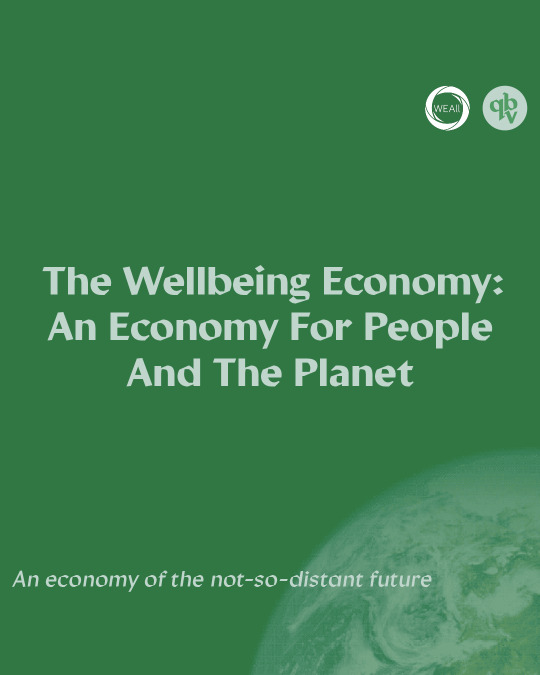
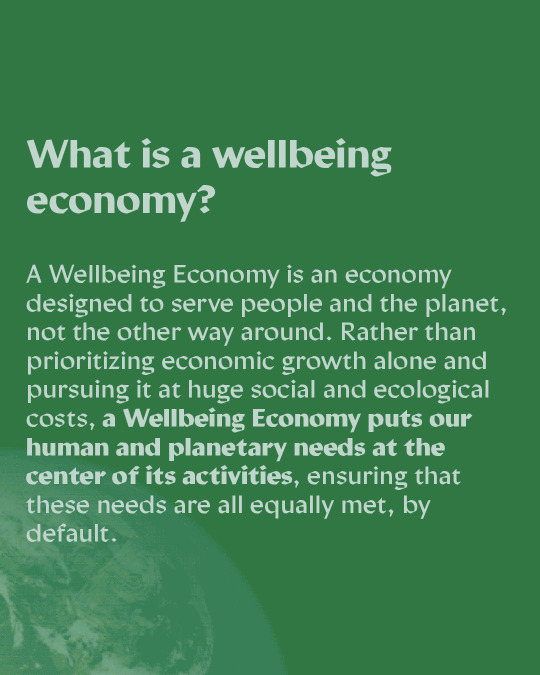
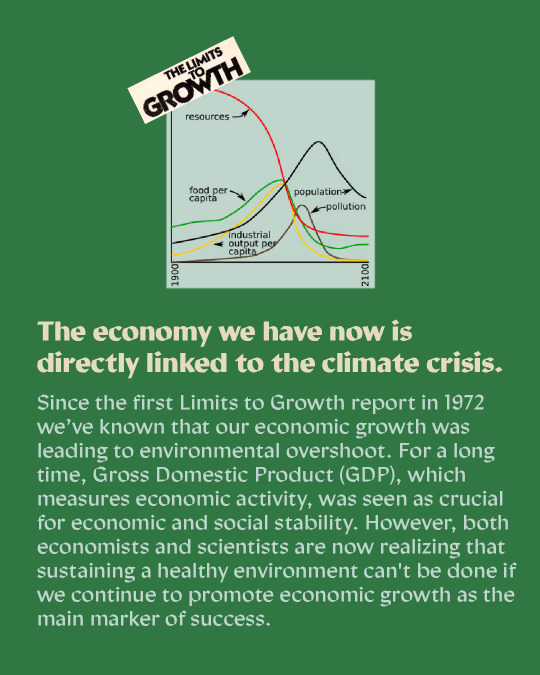
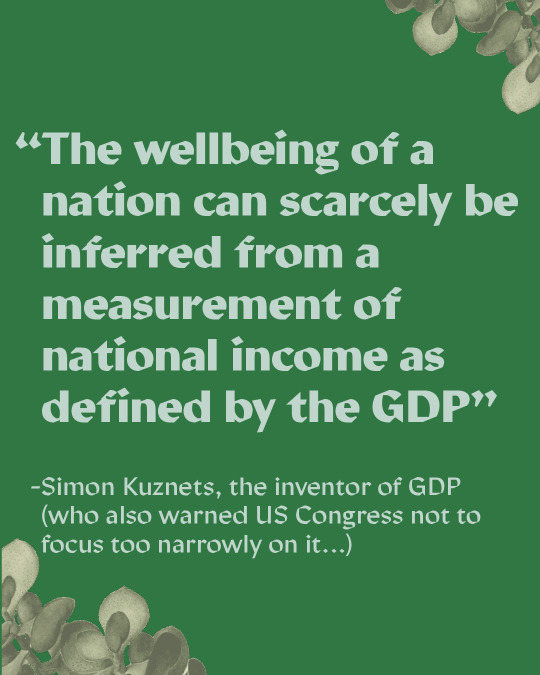
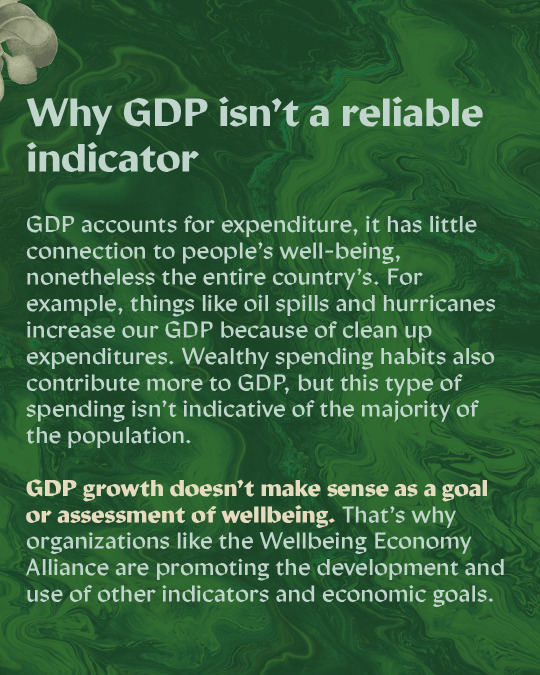
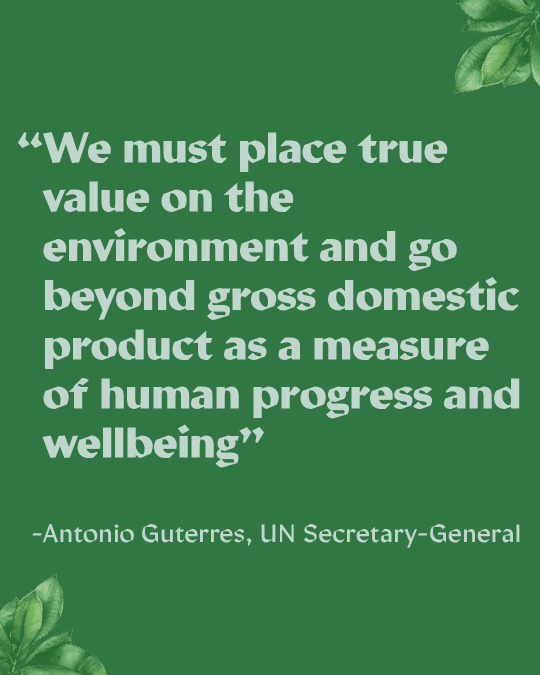
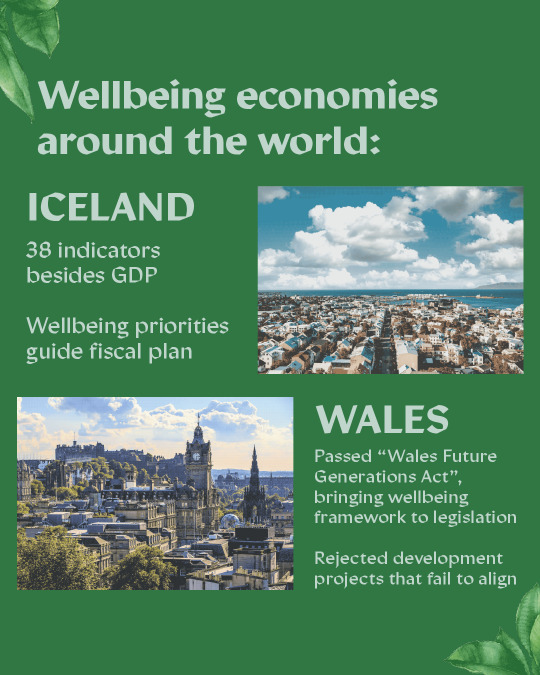
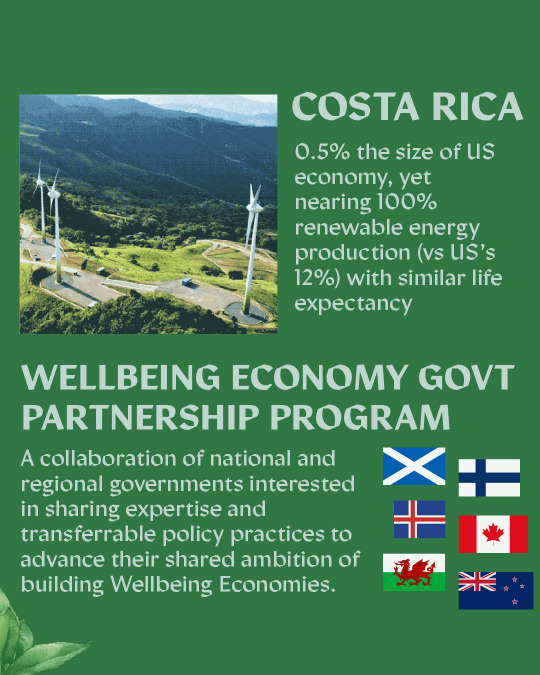
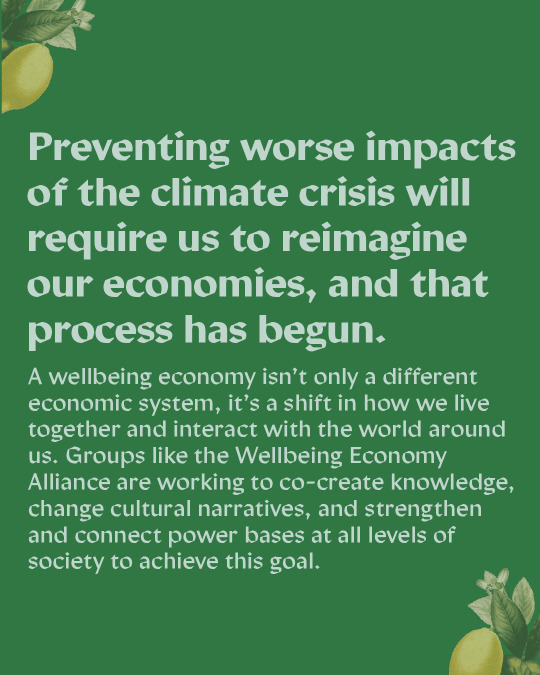
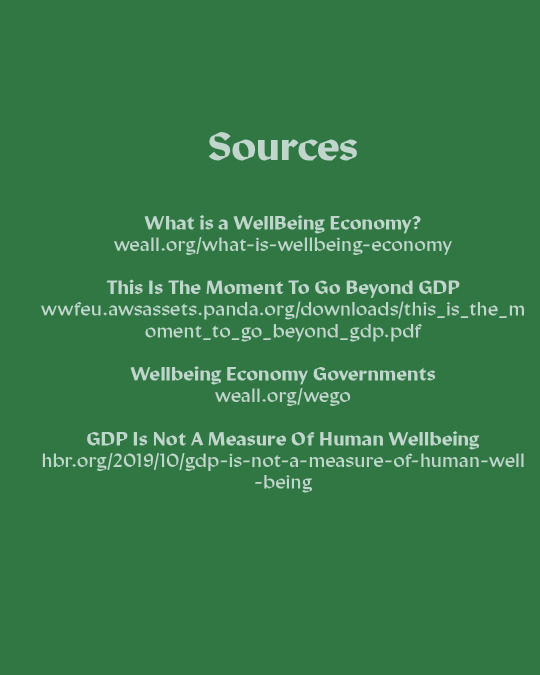
From my latest collaboration with the Wellbeing Economy Alliance! Their organization is dedicated to challenging economic growth as the only metric of wellbeing, because it fails to encompass so much.
Countries have started to enact goalposts for "wellbeing economies" which ask not only, "how will this contribute to economic growth?" but how will this help enrich people's lives and wellbeing? The changes have already been inspiring.
The key issue with GDP (which was never intended to be focused on so intently) is that it only accounts for spending. Why can't that be used as a metric? Things like oil spills positively contribute to GDP (more money spent on clean up), more hospital visits, virtually anything that requires money is "positive" for GDP. This metric also is biased toward rich people who spend exorbitantly more than the average person.
On our way to a sustainable future, wellbeing economies help provide a broader framework to make key decisions and measure social progress 🌞
Full post on my Instagram!
#queerbrownvegan#sustainability#climate change#environmentalism#environment#social justice#climate crisis#environmental justice#activism#intersectional environmentalism#economics#wellbeing#wellbeing economy
113 notes
·
View notes
Text
singlets don't have One brain, they have a Unified brain. every mind is like every body: a collection of increasingly smaller pieces working (or not working) in tandem with each other for the goal(s) of the collective.
in this sense, plurality is arguably the "truer" form of consciousness (if we play in the space of true/false consciousnesses), because it reveals the fact that there is no Intelligence to a mind, no singular will and identity that defines it. To exist is to be multitudes, to posses and be possessed by infinities above and below, to be entangled in the web of all other existence inextricably.
There is no "I" in team. No man is an island, even unto himself.
a cell is equal to a human is equal to an ant is equal to a tree is equal to a planet is equal to a galaxy.
do you see it? do you see the connections between everything? inside and outside of your-"self"? the eternal dance of germs and hair and wind and economics and evolution and everything?
free will is an illusion. be kind to the world, because you should be kind to yourself.
#antifath rambles#philosophy#ramblings#im not apologizing but i know i sound unhinged here#plurality#ecology#economy#sustainability#free will#without a solid identity i could not make a barrier between the world and myself#and so i see things as they are: interconnected
33 notes
·
View notes
Text
Fast fashion and crochet
While we're on the topic of crochet:
Please know that, unlike knitting, crochet cannot be manufactured by machines. This has a few consequences.
Labour exploitation:
Labour exploitation is rampant in the fast fashion industry: without it, the industry simply would not exist.
This means that if you see a genuine crocheted piece in a fast fashion shop, it was made by hand by someone who was paid peanuts for their labour, if paid at all.
Fibre crafts are very labour-intensive. This is why crocheted/hand-knitted items by indie designers are priced the way they are: you're not just paying for the materials. You're also paying for the hours that were needed to design and make the item. Even if the designer were to price those hours at minimum wage, they still add up.
Fast fashion strives to manufacture items as cheaply as possible. A lot of different things make up the final price you pay at a shop, such as design, materials, shipping, packaging, marketing,... Labour is only a fraction of that price, and garment workers rarely get paid a living wage as to keep the prices down.
Take this seven part TikTok breakdown of a crocheted Target bikini top by Drea's Hook, for example. After replicating part of the top, she estimates it would take about 3 hours to crochet the full item by hand (and it was crocheted by hand). That doesn't even account for the materials, the labour needed to sew the lining and the tag, the design, shipping, stock photos,... Yet it only costs $22. If the person who crocheted the top was paid at all, it can hardly have been more than a few cents.
Stolen designs:
On top of labour exploitation, there's been multiple scandals regarding fast fashion brands stealing designs by independent crochet artists such as Knots & Vibes or Loupystudio, among others.
Design theft not only profits off the work done by the original designer without any form of compensation in return, it also devalues the work needed to make an item.
The average person doesn't know how much work goes into making clothes. When fast fashion brands knock off original designs and sell them for a fraction of the price, it propagates the idea that the original item was priced unfairly. After all, why would someone charge €250 for a sweater when you can buy a similar one for €15 at H&M? This way, the industry keeps getting away with exploiting its workers while indie designers struggle to get by.
Can everyone afford to pay that €250? No, of course not. Even that €15 sweater can be a big financial hit if you're on a budget, and we all need clothes to keep us warm in winter. But practical issues aside, I think we can all agree that everyone deserves fair compensation for their work.
Conclusion:
People often assume their clothes have been made by machines. This is a logical assumption given the average fast fashion price tag, but unfortunately it's a wrong one.
Sure, we've got sewing and knitting machines and all other kinds of mechanical helps, but someone still has to work those machines. When an item has to be made by hand, like crochet, it will take longer. If the price tag doesn't reflect this extra labour, then neither will the worker's wage.
This blog will never shame anyone for buying fast fashion. Even if you're aware of the problems within the industry, there's plenty of valid reasons why quitting just isn't an option for most of us. We're stuck in a broken system that we cannot change overnight, and not everyone has access to alternatives.
That doesn't mean we can't chip away at it. Educating yourself about these issues is a big first step. It makes us more conscious about the clothes we wear and the labour and resources that went into making them, which in turn motivates us to take action. If more people were aware of these problems, the industry would be much less likely to get away with them.
#wasteless crafts#essay#random#community#fast fashion#slow fashion#sustainable fashion#sustainability#economy#capitalism#crochet#knitting#fibre crafts#fibre arts#consumption#labour#labour exploitation#design theft#labour rights
774 notes
·
View notes
Text
Sustainable Furniture: Sabai
Sabai about:
[...] In 2019, [Phantila] Phataraprasit co-founded Sabai—a Thai word that roughly translates to comfortable or relaxed—with business partner and college friend Caitlin Ellen.
[...] “The core of why we wanted to start Sabai is to make sustainable furniture that was accessible to people in our demographic, knowing that we are part of an age group that cares the most about this and wants to purchase according to those values, but are limited by things like budget, lifestyle and convenience,” she says.
Sabai CEO interview:
[Phataraprasit]: [...] We started an Instagram account that served as a great tool to leverage our community to understand what they cared about. When we started the design process, we would always go back to the Instagram community and poll them on, "What do you use your couch for?" "Do you like wide arms?" "Do you like thin arms?" It seems so simple in terms of, obviously, a couch is for sitting, but the insights that we received from that were helpful in informing the design process."
[...] It was definitely difficult for two relatively young women who had never started this type of company before and in a relatively traditional space to find any factory that was willing to work with us and basically take a bet on us. [...] When we finally did find a manufacturer who wanted to work with us, that was amazing, [...], but for us, we [...] had to find the sustainable alternatives to every component of the product so that was definitely a whole process in and of itself.
Sabai Materials blog post:
[...] OEKO-TEX certified hemp fabric is used in our Evergreen slipcovers [...] We wanted to ensure we were using [natural fibers] that uses less water than the cotton and linen options we’ve seen offered.
In place of traditionally used polyester upholstery fiber, we are using a natural fiber material made from a mix of coconut fibers and natural rubber wherever possible. The wooden legs are finished in a water based finish and the frame construction uses a non-toxic, solvent free glue.
[Sabai furniture] are designed to be assembled and disassembled easily with standard hardware and tools. Second, both seating collections are made to be repaired, individual parts can be purchased to replace in case of damage and cushion covers and slipcovers can be replaced to ensure the longevity of the product.
B Corp status of Sabai:
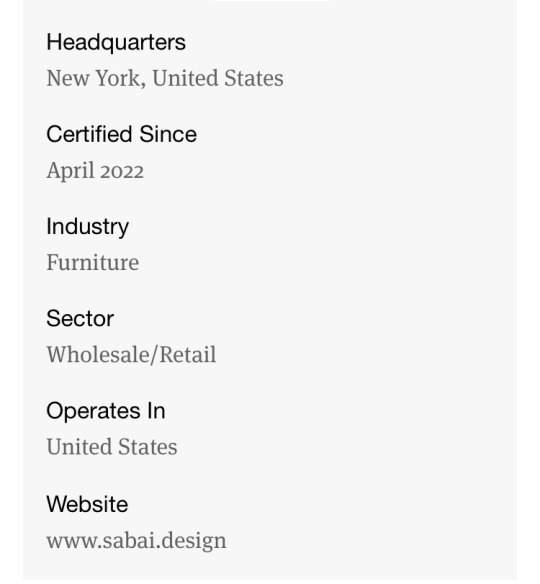
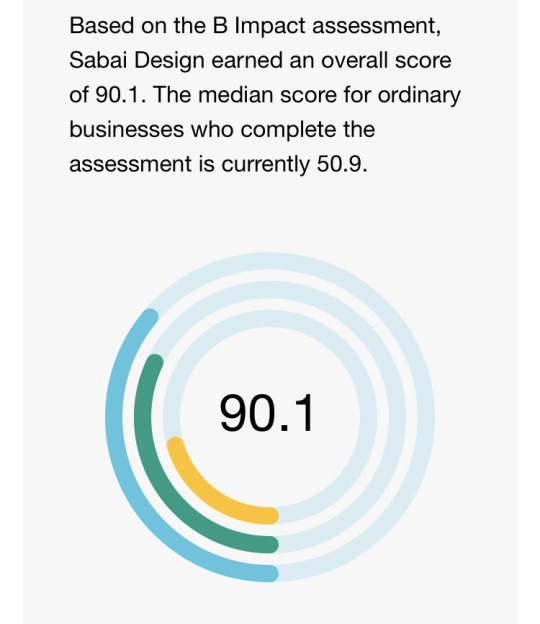
Sabai third-party product review:
#found this while considering shopping for a new couch#i think i might just invest in getting mine reupholstered/framed fixed to extend its longivity but#found this company in my search (for future reference) for sustainable furniture thats not necessarily second hand#my greens#sabai#sabai furniture#aapi#sustainable economy#sustainable furniture#furniture#interior design#non toxic#sustainable industry#women owned business#home health#green link
1 note
·
View note
Text
do all the nine houses use the same currency. if not, how much has the ninth house had to devalue in order to maintain levels of trade necessary to get supplies. what are their interest rates like.
#it's implied their economies are somewhat separated despite being an empire bc of the idea of turning into a 5th house vassal state etc#but like. the ninth house has a GDP of like. zero. how does that work.#they have their old treasures and such like the vatican but they don't get tourism dollars and also have actual residents not just cardinal#like the way it's described the fifth house has a fully functioning self sustaining economy basically#meanwhile the fourth house produce....cannon fodder? that's it? are families compensated for joining the cohort is that their entire econom#the seventh house....has an old monarchy but what resources? what is average life for a normie citizen like?#tlt
29 notes
·
View notes
Text
People should get reimbursed for commute time
If it takes someone over an hour to get to work, that should be part of their pay.
Many people have to commute long distances/through areas of slow traffic because they cannot afford to live closer to their workplace. This is also why work from home is a big thing.
If corporations want people to return to their offices, they need to make it appealing enough. I'm not going to fight through traffic for 2 hrs in my free time just to sit at a computer all day, when I could just stay home and don't waste that time.
Corporations would be forced to invest in local affordable housing, perhaps even affording housing credits. They would need to invest in local infrastructure (which in the US is falling to pieces) and improve public transport in their area (faster commute -> less cost to the company, less cars on road -> traffic moves faster, employees without cars would still be able to get to work). Also people would be less stressed and actually take the time to drive safely because they wouldn't feel the need to rush. It would make companies actually take an interest in how their workers get to work and investing in local communities.
I live sort of near DC. We have a HUGE amount of workers commuting into the city and its surrounding cities. Retail workers also have to commute to these cities and suburbs because they cannot afford to live in those areas. My boyfriend commutes an hour to his part time job at a kennel in a rich town. A lot of people live in the more affordable, lower income, far away areas in the nearby states because housing prices in my area are fucking insane. I knew someone who commuted 2+ hours to work and 2+ hours back. There are people who drive even more than that.
And where do these employees have to live? Food deserts. Crumbling infastructure. No parks, no walkability, no public transport, bare bones everything. Only the cities which only the few can afford have basic infrastructure. And even the people living there have to commute to OTHER even richer areas. There's a ton of places where housing developments have just been shoved and are surrounded by nothing but farms. There's nothing local to do, so everyone goes to the closest town and city. It's also why you see a lot of older towns have abandoned main streets. Why have your business cater to the 100 people who live there when you can be in a city with thousands?
There has been some recent interest in paid commute times. 1 2 especially with corporations trying to get workers to go back to the office. Personally, I love working in my office because having a separate space outside my home helps me keep work and home separate and allows me to focus easier since I'm not in "home mode". I don't have room for an office in my parents house so working from home kinda sucks rn even though it would help a lot since I'm disabled. But it is nice being physically near my coworkers, even if it gets annoying sometimes. Also many jobs involve fieldwork (like mine!) which can't be done remotely anyway!
There would be incentive for corporations to keep their employees close AND provide more remote work options for those living farther away. As well as matching pay to fit rent/housing prices in the area (or vice versa).
Also there needs to be something done about corporations having their entire workforce sourced from another country entirely, working for pennies. But that's an even more complicated situation that I don't have experience in.
#long post#its 6am rant time#its so much more sustainable to have people live and work in the same communities#so many resources are spent on commute#i like my drive because it gives me time to wake up and i like just sitting n focusing for a bit#but my commute is also pretty easy since I am going away from the city towards the lower income areas#on the other direction it is backed up completely most days#we drive a lot during work to bc we visit different restoration sites and we get paid for those driving times!#it all comes down to corporations not giving a shit about their employees lives#pls dont try n dox me there are a ton of areas near DC like mine#so its harder than you'd think#but yea ive seen some crazy fucking traffic and commute times#corporations should invest in their communities instead of acting like fucking parasites#remote work#return to office#commute#labor rights#id love if sustainable city experts n economists chimed in#sustainability#sustainable cities#local economy#community
40 notes
·
View notes
Text
Circular thinker Ellen MacArthur: 'Simply consuming less is not a goal'

Ellen Mac Arthur Foundation: our timeline
As a child, she saved her lunch money to buy her first boat. At the age of 28 she became the fastest solo sailor around the world. Today, Ellen MacArthur is one of the most influential voices for a new, greener industry. 'Why would we make packaging that we throw away after one use? As humanity we can do better.'
Ellen MacArthur (47) became world famous overnight in 2005, when she sailed solo around the world in just 71 days, breaking the world record. “I didn't write much in my diaries during that trip,” she says. “But I remember clearly at one point writing down, 'This is all I have.'” If you run out of diesel or food, you can't just stop somewhere in the middle of the ocean and buy extra. With that idea in mind I went back on land. I realized: 'This is not just about sailing, but about our entire economy.' We have the raw materials we dispose of, and we have to do it with those.
That insight would determine her future life. 'I never thought I would stop sailing professionally. But I realised that I could use my fame to do something with it.' That 'something' became the Ellen MacArthur Foundation[1], an influential non-governmental organization (NGO) that wants to get rid of our throw-away economy and, together with companies, scientists and policy makers seeks for a better use of our raw materials.
The determination with which the British dogged herself in this is the same as that which took her to sea at the time. She grew up in rural Derbyshire[2], England. 'We grew our own vegetables. My favourite thing to do was to walk with the dog in the fields, hills and forests. There was no sea to be seen for miles.” But when her aunt Thea took her on a sailboat as a 4-year-old, she was sold. “It was a small boat, but I felt like it could take me anywhere. That was the greatest feeling of freedom I could imagine. All the doors suddenly opened at the same time.”
She saved the money she got for her school lunch to buy her first sailboat. Whenever she could, she went to sea. When she was told at the age of 17 that she was 'not smart enough' to study as a vet - even though she had prepared for it for three years by working at a local vet on Saturdays - her choice was made. “I would go sailing. I have no idea how I was going to do that, but that was the objective.”
Her foundation has now grown to a team of 200 people and she sits at the table with the CEOs of multinationals such as Gucci, Amazon, Philips and Morgan Stanley and at the highest political levels. The Ellen MacArthur Foundation advises policy, informs the general public through podcasts, and works closely with the various industries. She is working on better battery technology with the chemical company Solvay, the utility company Veolia and the car manufacturer Renault. In the project The Jeans Redesign[3], she is working with more than a hundred brands, spinning mills and producers to find out what sustainable jeans trousers should look like.[4]
“The idea to create that organisation was not there from the beginning,” MacArthur says. “I first thought: 'Maybe I can wake people up by sailing around the world with a large message on my sail.’ But what message should that be? I had to look for that first.”
How do you mean?
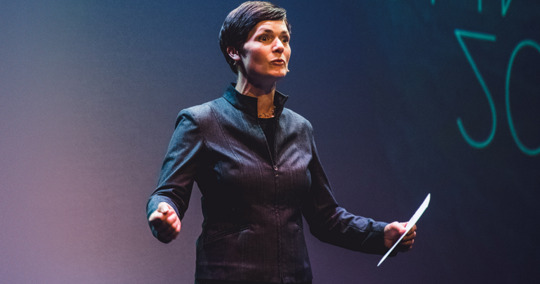
Ellen MacArthur
Ellen MacArthur: “I'm a sailor, not an economist. At first I didn't even understand what problem I had to find a solution for. I just felt intuitively that nothing was right.”
“After my trip around the world, I went to the south of the Atlantic Ocean in the winter of 2005 for a documentary about albatrosses. I stayed on an island on which there was a former whaling station. Thousands of people used to work there. An entire city had been built around it, with a church, refectories, dormitories and doctors' offices. Now it is completely deserted. They took 175,000 whales out of the sea, but then they ran out of whales.”
“Are we doing the right thing?” I wondered. “When one resource is used up, do we simply switch to another? How many times can we do that?'
Where did you find the answer?
MacArthur: 'Not by sitting and thinking on my own. I started visiting factories and power plants and talking to economists, environmental experts and CEOs. One day I was sitting with the big boss of Castorama. The French DIY chain was part of the Kingfisher group that had sponsored me for years. It soon became about doing more with less: using fewer raw materials to make products.'
'It struck me that everywhere I went, 'less of everything' was the strategy towards sustainability. Let's just use fewer resources, travel less, buy less. But how can that be an objective? Where does that end? What are we going to use to make cars then? Or is it our intention to sell as few cars as possible? That's not realistic. “Always less” is not a goal. That's the problem with sustainability: we don't know where we want to get. In a meeting it was said: we need sustainable products. But no one could give an answer to what such a sustainable product could look like.'
'Then I saw a drawing in a book. There was a straight line and a circle drawn underneath it. “That's it,” I thought. Since the industrial revolution we have been in a linear logic. We use up raw materials and fossil fuels, waste piles up, we cause pollution and climate change. On the other hand, there is a circular economy. This is how life on Earth has worked for billions of years. There is no waste in a forest, everything regenerates. This is what our economy could also look like.'
'As humanity we are so inventive. Why on earth would we make packaging that we throw away after one use and that we can't use anymore? We can do better, right? From the design stage we should say: 'We are making something that will then be reused. That's just common sense."
To promote that idea of a circular economy, you launched the Ellen MacArthur Foundation in 2010. Where did you start?
MacArthur: “ We first identified with the consultant McKinsey what could we possibly gain by a different approach. The numbers were staggering. For the entire European economy, we arrived at an amount of 630 billion dollars if we make better use and reuse of our raw materials. We looked at what could be done differently, for example in vans, washing machines, smartphones or the use of cotton. In 2012 we presented that report at the World Economic Forum in Davos. Naturally, many raised eyebrows. But six months later we did speak in the European Parliament, and we spoke to top industry figures. That has put a lot in motion.”
What exactly can be done differently with washing machines?
MacArthur: 'Today this is the model: the manufacturer buys raw materials, makes a washing machine and sells it. He only starts to make money if he also can sell the next machine. In other words, he benefits from the machine breaking down. What do we see then? A cheaper machine will not last as long. The costs per wash are therefore almost one and a half times higher than with a more expensive appliance.'
'Shouldn't we strive to keep the costs per wash as low as possible for everyone? Perhaps we should evolve towards a model where the manufacturer benefits from the machine lasting as long as possible and being maintained as well as possible? Perhaps the machine remains the property of the manufacturer and he can reuse the materials if the machine breaks down? You simply have to rethink the entire mechanism.”
There must be time and space for that. For an SME that is busy managing everything that comes in its way every day - the pandemic, the energy crisis, geopolitical tensions, inflation - reinventing the entire business model is not an option.
MacArthur: 'When I hear that, I always think of the climate summit in Glasgow two years ago. I sat on a stage with Emmanuel Faber, the former CEO of Danone, and Philipp Hildebrand, the number two of BlackRock, the world's largest asset manager. An American moderator said: 'I understand the circular thing, but it is about a complex transition that will cost money.' Hildebrand turned to him and said: 'If we do nothing about the climate problem, our prosperity will decline by a quarter. So it's not a matter of what it will cost. Business as usual just doesn't work anymore."
'That's what it's all about for me. If you don't have time to think about it, you will soon cease to exist. Sustainability is not something you put in a separate report. As a farmer, why wouldn't you strive to grow your crops in such a way that the soil becomes richer, not poorer? Why not get to the point where driving a car does not harm the environment? How a company operates should contribute to solving our biggest global problems.'
What role can a circular economy play in our green ambitions?
MacArthur: 'If we want to limit global warming to 1.5 degrees Celsius, 55 percent of the effort must come from the energy transition. This is about renewable energy and reducing CO₂ emissions from fossil fuels. But 45 percent will have to come from how we make things different: from food to clothing. This is about our manufacturing industry, but also about our agriculture. That makes it hyper-relevant.'
Do you see yourself as a climate activist?
MacArthur: “No. I just went on a personal journey. Our world population is growing. Our raw materials are finite. That is not sustainable. I want to spread that message. That doesn't make me an activist, I'm a realist.'
How pragmatic are you in this regard? The clothing sector faces enormous challenges. A company like Primark, which is criticised everywhere for the way it does business, is a member of your community. This way it can polish its image very easily.
MacArthur: 'Look, we work in an economic reality. I think there are good arguments for talking to everyone, not just those who are already doing well. We have also done the same with plastic. From conversations with many top people from that industry, it turned out that no one had an overview of the entire chain of plastic packaging. This is not different in the clothing sector. Everyone just produces. But what does that mean on a global scale? It is never about one company alone.'
'We spent a year researching plastic packaging, a business worth hundreds of billions. We presented the results in 2017. The numbers were dramatic. Barely 2 percent of all packaging that came onto the market was recycled into an equivalent material. However, we all feel that we have become very good at recycling.'
'With those results we were able to bring competitors and policy makers to the table. Where should we get? Ultimately, 20 percent of companies signed a commitment in 2019 to set ambitious goals for 2025.'
The ambitious goals to reduce single-use plastic are now proving unattainable. You admitted that too. What is more: in some areas we have even gone backwards.
MacArthur: “Yes. We see that the companies that have endorsed the objectives are doing significantly better than their sector peers in tackling plastic waste. It does make a difference.'
'But to get the entire industry on the right track, an international approach is needed. This is currently being negotiated, and that is necessary. Small flexible plastic packaging is a disaster. The problem is only getting bigger. They are not collected or recycled, especially in emerging countries where there are no collection systems. One company that puts a lot of money and energy into innovation is not going to change that. It is a system error. You have to set that straight.”
Where is that starting point?
MacArthur: 'By realising that everything is connected. When you sail around the world on a boat, you also have to take several systems into account at the same time. You are a system yourself. You have to stay alive. That's easier said than done. You are not hungry, and yet you have to eat. You need to get enough sleep. Then there is the boat, which is also a system in itself. You have sails, electronics. If the batteries are not charged, the autopilot will not work and you will be upside down 20 seconds later. Sometimes I slept next to the wheel. And then there is the third system: the weather. You keep an eye on this via satellite images. You try to predict the wind, because that determines how fast you go.'
'That connection also applies to our economy. It is a large system that embraces the world, but at the same time it concerns each individual. It concerns every sector. That's a difficult balance. On the one hand, you have to zoom deep enough into the practical details of a problem, such as setting up a collection system for a specific plastic. On the other hand, you have to see the big picture.
Can't an agricultural waste stream be converted into a better type of plastic, for example?'
'You cannot solve any problem alone. That requires a different mindset than what we learned at school. We have not learned to think circularly.'
The consumer must also be on board. As long as he buys clothes from Primark and throws them away after wearing them twice, we won't get there.
MacArthur: 'The general public is needed to set the system in motion. People can certainly force companies to change through social media. But that is also not a solution. After my sailing career I changed my life. I started traveling less and I built a house that requires hardly any energy. But to be fair, I also had the means for that. Not everyone can say that. And even if everyone could do it, it wouldn't solve everything, precisely because the entire system needs to change. But it is true that the buy-in from the general public is needed. And it is true that many people are not yet on board today.'
So you hear politicians in Europe say that we should tone down our green ambitions. British Prime Minister Rishi Sunak scaled back the targets.
MacArthur: 'That brings me back to Glasgow. Business as usual no longer works. We'll have to jump eventually. The question is simply: how long do you cling to your old ideas and when do you dare to jump? There are already opportunities. There are start-ups that focus on reselling or repairing clothing that is now worth billions.'
'What is particularly unfortunate about the political turn is that companies have already invested to achieve those objectives. They bang on the table and say: 'We need policies to be ambitious. There must be a level playing field.' Rightly so. That's the surprising thing about the criticism on Sunak. In the past, companies wanted to leave everything the same, but now they want to move forward more and more.'
You are a realist, you say. Are you also an optimist? Can we move fast enough to make the change in time?
MacArthur: 'I am convinced that it is possible. Whether it can be done quickly enough is another matter. Although we should not underestimate ourselves. During the pandemic, companies have accomplished in four weeks what would otherwise take four years. Covid was terrible, but as humans we have shown what transformation we are capable of.'
'My great-grandfather was a miner. He died when I was eleven, so I remember him well. He was born in 1894, when barely a handful of cars were on the streets. Everyone still moved by horse and carriage. When he was 45, the first computer was built. Twenty years later there was the microchip. When he died, the Internet had just been invented. And now we have artificial intelligence. If we really put our minds to it, things can happen quickly. We just have to determine what we are going for.'
Profile
Ellen MacArthur (47) grew up with two brothers in a small hamlet in England. Her parents were both teachers.
MacArthur became known as a professional sailor. In 2001, as a 24-year-old, she came second in the Vendée Globe, a tough competition in which sailors sail solo non-stop around the world. In 2005 she broke the record: she sailed solo around the world in just 71 days. Her achievements earned her the title Dame Commander of the Order of the British Empire (DBE), the female equivalent of a knighthood.
In 2010, she launched the Ellen MacArthur Foundation, a foundation that promotes the circular economy to tackle climate change, biodiversity loss, waste and pollution. She wrote several books, including the autobiography 'Taking on the World' (2002), 'Race Against Time' (2005) and the second autobiography 'Full Circle' (2010).
She is the founder and CEO of the Ellen MacArthur Cancer Trust, an organisation that inspires young people recovering from cancer through sailing.
How a company operates should contribute to solving our biggest global problems.
Source
Stephanie De Smedt: Circulair denker Ellen MacArthur: ‘Gewoon wat minder consumeren is geen doel’, in: De Tijd, 4-11-2023, https://www.tijd.be/dossiers/changemakers/circulair-denker-ellen-macarthur-gewoon-wat-minder-consumeren-is-geen-doel/10503957.html
[1] The Ellen MacArthur Foundation, launched in 2010, works to accelerate the transition to a circular economy. It develops and promote the idea of a circular economy, and work with business, academia, policymakers, and institutions to mobilise systems solutions at scale, globally. https://ellenmacarthurfoundation.org/
[2] Derbyshire is a ceremonial county in the East Midlands of England. It borders Greater Manchester, West Yorkshire, and South Yorkshire to the north, Nottinghamshire to the east, Leicestershire to the south-east, Staffordshire to the south and west, and Cheshire to the west. Derby is the largest settlement, and Matlock is the county town. The county has an area of 2,625 km2 (1,014 sq mi) and a population of 1,053,316.
[3] https://www.ellenmacarthurfoundation.org/press-release-jeans-redesign-ellen-macarthur-foundation
[4] Read also: https://www.tumblr.com/earaercircular/724173405892608000/from-10000-litres-of-water-to-zero-the-denim?source=share & https://www.tumblr.com/earaercircular/687936102220382208/mud-jeans-and-saxion-make-first-circular-jeans?source=share
0 notes
Text
I wish they'd make nut mixes that aren't like 80% almonds, the shittiest most garbage nut
#And that didn't cost like a trillion dollars due to Economy#I swear to god I used to get a bag at Fleet Farm that was like 9.99 for 2 lb and I would fuciking SUSTAIN on that shit while camping#Now it;s like 20$ or something due to Economy
15 notes
·
View notes